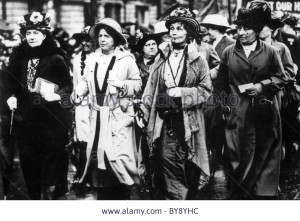Anita Elizabeth Hughes (born 1892): Politics and Protest
Anita Elizabeth Hughes’s autobiography focuses on her personal life fully. Even when big events are happening in Britain such as the First World War they are only mentioned in passing. So political movements, which would have been widely talked about during the late 19th and early 20th Century, are almost forgotten from the memoir completely.

The only political movement to which Anita refers is the Suffragette movement. Though she never discusses feeling any politically strong opinions it is easy to assume that Hughes mentions the suffragette’s because they fought for women’s liberation. She never mentions a desire to vote but as a woman the suffragette movement changed things for her.
The suffragette movement began in the late nineteenth century and it was around this time that Hughes encountered the suffragettes in Preston Market Square. She discusses the treatment that women went through from the crowd: “They would stand on a box…seen lots of stuff thrown at them, rotten tomatoes etc” (7) It is clear that the women were not well received, as many were hostile to their plan for women’s rights. Despite this tormenting, the women carried on with their speeches: “it caused a lot of laughter but they carried on” (7).
Though Hughes shows no appreciation for the women’s suffrage movement, critics and historians suggest that she was typical of the thousands of working-class women from the cotton mills who joined the movement: “These women the radical suffragists , knew at first hand the the harsh conditions under which the majority of women lived” (Liddington, 20, 1985). Anita certainly listened to some of the movement’s famous leaders: “I heard Mrs. Pankhurst and Mrs. Despard” (7). Even though it appears she cared little for politics, it is safe to say the women’s suffrage campaign did effect her later life when she was finally able to vote.
Bibliography
- Hughes, Anita Elizabeth. “My autobiography” 1.357 on your author in The Autobiography of the Working Class: An Annotated, Critical Bibliography, ed. by John Burnett, David Vincent and David Mayall (Brighton: Harvester, 1984, 1897, 1989) 3 vols.
- Liddington, Jill. Norris, Jill. One Hand Tied Behind Us: The Rise of Women’s Suffrage Movement. Virago History: 1985
Image Reference
- Image taken from website dedicated to photos of the women’s rights movements – http://www.alamy.com/stock-photo/votes-for-women-british.html

Leave a Reply